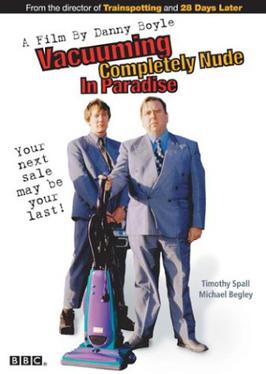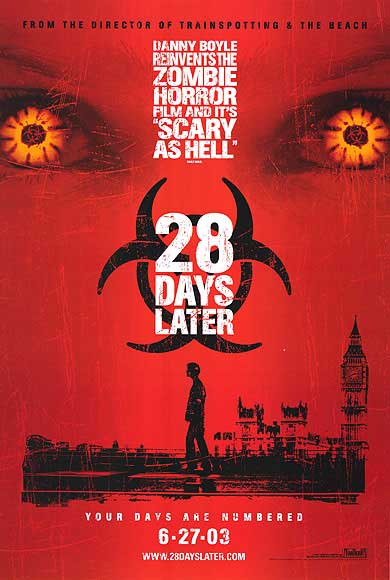 To celebrate Danny Boyle directing the Opening Ceremony for London Olympics 2012, over the next couple of days, I will be charting the career of one of Britains top director...
To celebrate Danny Boyle directing the Opening Ceremony for London Olympics 2012, over the next couple of days, I will be charting the career of one of Britains top director...Before we move on, it is worth noting that prior to The Beach Danny Boyle was involved with a three-director-combo of a movie alongside Guillermo Del Toro and Gary Fleder. Originally to be written by Kevin Smith, Alien Love Triangle was due to be thirty-minutes long - alongside the other two movies Mimic and Imposter. Alas, the latter two became feature films leaving Alien Love Triangle on the shelf. So Boyle moved onto The Beach (Go back to Part 2 to see how that turned out... )
 Strumpet (2001)
Strumpet (2001)Following The Beach and the fall out he had with Ewan McGregor, Boyle returned to his roots - television and theatre. Made for the BBC, Strumpet and Vacuuming... were both written by esteemed playwright Jim Cartwright, though, unlike the films of Boyle, these television-projects were produced by Martin Carr - opposed to Andrew MacDonald. Strumpet is a rags-to-riches story involving poetry and music. Chris Eccleston plays a poet whilst Genna G plays a musician who, though shy, expresses herself purely through music. The two meet and their passion becomes exceptionally successful and the film eventually leads to London whereby they perform on Top of the Pops. To some extent we see some features of his previous films - and a tantalising glimpse into the future - as the finale in London reminds us of Trainspotting whilst the odd-match between Strayman (Eccleston) and Strumpet (Genna G) - Strayman who can only speak in words of poetry whilst Strumpet, who cannot speak, but can sing - as a slight echo of the strange duo of Diaz and McGregor in A Life Less Ordinary. The special thing about both these films is the use of digital cameras - very bad quality in their nature - Boyle manages to utilise the small-nature of the cameras by placing them in obscure positions capturing characters dancing across a room whilst the camera sits in the corner, on the floor, observing the characters.
 Vacuuming Completely Naked in Paradise (2001)
Vacuuming Completely Naked in Paradise (2001)I believe this film is the strongest of the two television-projects - written again by Jim Cartwright. Vacuuming ... has a central performance in Timothy Spall as a salesman. He is a salesman who has sold for years and though experienced, he clearly has his own tragic situation that we begin to understand through the eyes of newbie salesman Pete (Michael Begley). Again, digital cameras are used to cover the conversations the two characters have in a car - as the camera seems to be stuffed into the glove compartment. Released within the same period as The Office, this film tackles the monotonous aspects to some characters lives and, it doesn't take long before you realise that Tommy (Spall) and his ambitious attitude to win the 'Golden Hoover', cover some misguided sense-of-self. A sub-plot involving a woman who lives alone in a flat and collects countless newspaper articles adds an interesting dynamic as the film explores the complex issues about memories and the past. The film ends in Blackpool as the characters find out who wins the prize - with a poignant finish on a beach between the two lead actors.

28 Days Later... (2002)
Nevertheless, it was Alex Garland who pulled Boyle from the dolldrums of television as he penned a script for Boyle. Boyle recruited some old-school friends - Andrew MacDonald producing, Alex Garland writing (having written the novel The Beach), Chris Gill - having worked together on the television-films - and even Christopher Eccleston - having starred previously in Strumpet and Shallow Grave. But this also marked a collaboration with crew who would pave the way for the future of Danny Boyle: Anthony Dod Mantle as cinematographer and John Murphy composing the music.
28 Days Later reestablished Boyle, as he created an insightful horror film tackling the parrallels zombies have with a society akin to George A. Romero. Even the mundane, mononous lifestyle of Timothy Spall in Vacuuming... was an exploration of similar themes. Iconic shots of London, completely empty - apparently filmed at 4am on a summer morning - seemed strangely similar to Vanilla Sky's empty New York streets, one year prior - but this set-up was no dream. Opposing to the exceptionally fast-paced running of Trainspotting, 28 Days Later... showed us one character, walking around, like a zombie, trying to figure out what had happened. This was the gritty reality of a post-apocalyptic world with the cold atmosphere from Dod Mantle and the incredible 'used-too-much-in-trailers-since-the-film' music from John Murphy whilst, hitting the jackpot again, with the lead actor: Cillian Murphy.
But Boyle didn't rest on his laurels just yet, a smaller-scale film was in the works - as if to prepare him for work with two child-actors, next stop, Millions ...
This post was originally published on 17th July 2010



